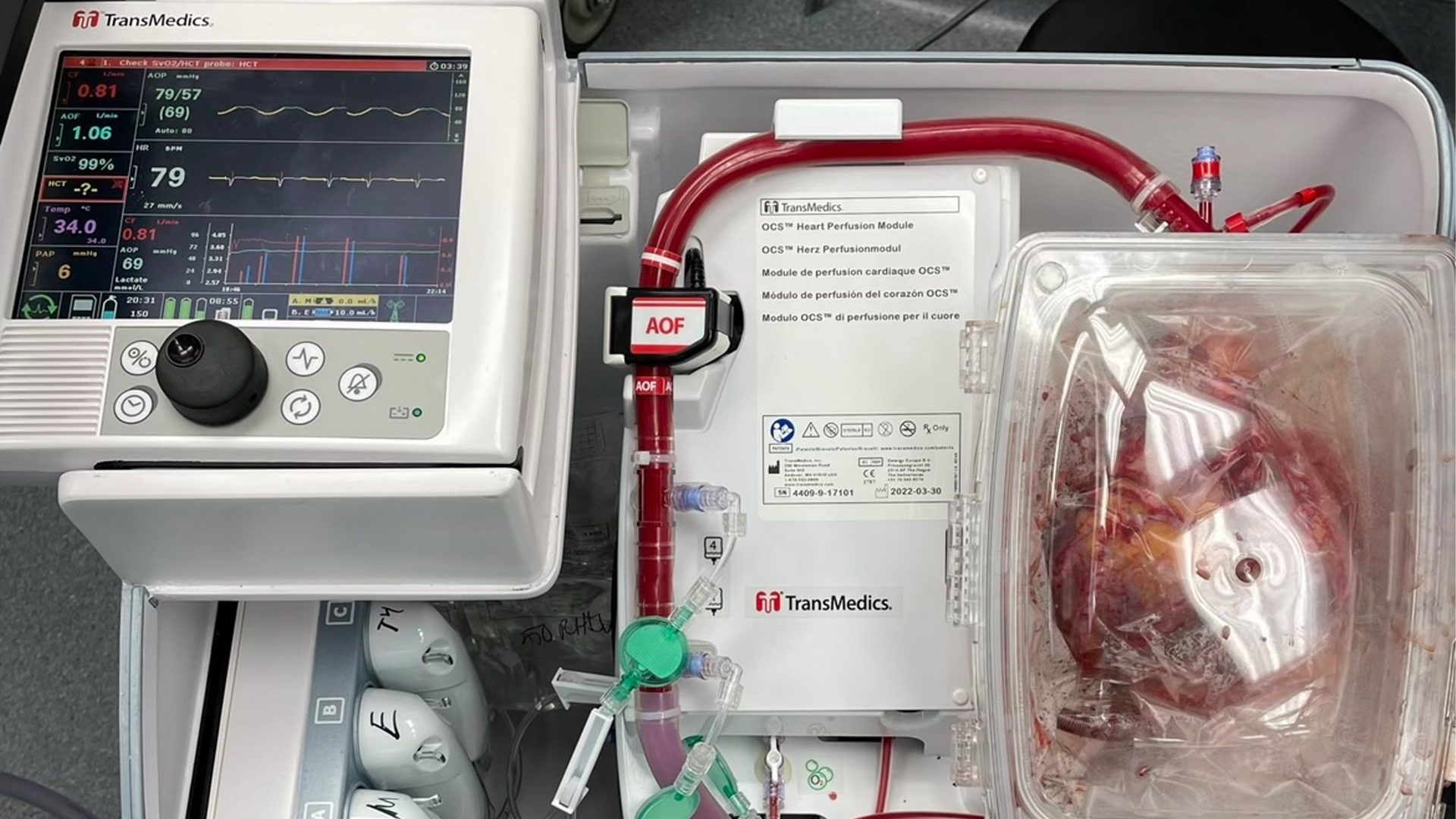
Atrium Health Sanger Heart & Vascular Institute Using New Technology to Preserve Donor Hearts for Lifesaving Transplants
New system keeps a donated heart beating as it’s transported
CHARLOTTE, N.C., Sept. 8, 2022 – Atrium Health Sanger Heart & Vascular Institute’s heart transplant team is using new technology to keep hearts viable while being transported to a waiting heart transplant recipient. The portable technology, called the TransMedics Organ Care System (OCS), expands the amount of time a donated heart can be suitable for transplant, helping make more donated hearts available for those who need them.
“Once a heart is removed from a deceased donor due to cardiac death, the portable system revives the heart and keeps it beating, infusing it with blood from the donor that is supplemented with nutrients and oxygen,” said Dr. Eric Skipper, a cardiothoracic heart transplant surgeon at Atrium Health Sanger Heart & Vascular Institute. “The system also allows us to carefully assess the heart’s functional quality and viability for transplant before we reach the operating room to perform the transplant.”
According to Skipper, OCS eliminates the time restraints that can require turning down a donated heart. Previously, the Sanger Heart & Vascular Institute transplant team could only accept donor hearts from within a 500-mile radius. That’s because there is a 4-hour cold storage limitation for the organ and the travel time between the deceased donor and a patient waiting for a transplant in Charlotte would exceed that. Now, with the use of the new technology, the donor pool has expanded because the heart can be kept viable for up to eight hours and be received from up to 1,000 miles away. It also allows for the acceptance of higher-risk hearts, including those from older donors and donors who are initially put on life support before withdrawing care, referred to as donation after cardiac death donors.
The first patient to receive a donated heart preserved via the new technology at Atrium Health had their transplant completed recently and is currently recovering in the hospital.
“This was a patient who was potentially looking at a long wait for an organ transplant,” said Skipper. “But because of the ability to utilize this technology, they were able to receive a heart very quickly.”
Sanger Heart & Vascular Institute is the only transplant center in the greater Charlotte region currently using this technology and was identified as an ideal location because it is a high-quality and high-volume transplant center. The transplant team utilized Atrium Health's MedCenter Air to transport the team to and from the donor location.
The U.S. Food and Drug Administration approved the use of this device in April 2022 to preserve hearts for donation after cardiac death. The approval followed results from a multi-center clinical trial comparing the use of the technology to the traditional cold storage method of preserving donated hearts during transport. The study found that using the OCS resulted in 90 patients (of the 180 randomized and transplanted patients) receiving organs that were previously unable to be used prior to this technology. Those recipients had a one-year survival rate of 93.3% compared to an 87.3% one-year survival rate among a control group where OCS was not used.
“We were always limited to accepting organs from donors who suffered immediate brain death,” said Dr, Joseph Mishkin, an advanced heart failure transplant cardiologist at Sanger Heart & Vascular Institute. “We now can accept organs from donors who have suffered an irreversible brain injury but do not meet formal brain death criteria. In these instances, the family has decided to withdraw care. The donor’s organs can now be a life-saving gift for others.”
Across the U.S., more than 3,300 people are on the waiting list for a heart transplant and 95 of those are waiting in North Carolina, according to the U.S. Department of Health & Human Services Organ Procurement and Transplantation Network.
“We face a nationwide shortage of donated organs. I expect this technology to transform the transplant industry, increasing the national donor supply and helping us transplant more patients in need,” said Mishkin.
About Atrium Health
Atrium Health is a nationally recognized leader in shaping health outcomes through innovative research, education and compassionate patient care. Based in Charlotte, North Carolina, Atrium Health is an integrated, nonprofit health system with more than 70,000 teammates serving patients at 40 hospitals and more than 1,400 care locations. It provides care under the Atrium Health Wake Forest Baptist name in the Winston-Salem, North Carolina, region, as well as Atrium Health Navicent and Atrium Health Floyd in Georgia and Alabama. Atrium Health is renowned for its top-ranked pediatric, cancer and heart care, as well as organ transplants, burn treatments and specialized musculoskeletal programs. A recognized leader in experiential medical education and groundbreaking research, Wake Forest University School of Medicine is the academic core of the enterprise, including Wake Forest Innovations, which is advancing new medical technologies and biomedical discoveries. Atrium Health is also a leading-edge innovator in virtual care and mobile medicine, providing care close to home and in the home. Ranked nationally among U.S. News & World Report’s Best Hospitals in eight pediatric specialties and for rehabilitation, Atrium Health has also received the American Hospital Association’s Quest for Quality Prize and its 2021 Carolyn Boone Lewis Equity of Care Award, as well as the 2020 Centers for Medicare & Medicaid Services Health Equity Award for its efforts to reduce racial and ethnic disparities in care. With a commitment to every community it serves, Atrium Health seeks to improve health, elevate hope and advance healing – for all, providing $2.46 billion last year in free and uncompensated care and other community benefits.
